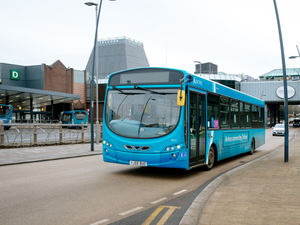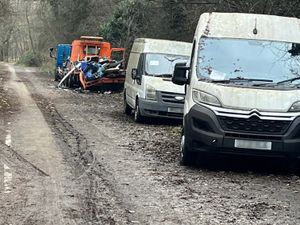Council's 'red bus' fleet could be used to fill gaps in traditional public transport
The council’s own “red bus” fleet could be used to take rural dwellers to and from the Wrekin area’s main towns, to fill gaps in traditional public transport, a committee has heard.

Telford and Wrekin Council aims to publish its local Bus Service Improvement Plan by the end of this month, detailing how it will use its powers to improve services.
Communities scrutiny committee member, Eric Carter, noted that there was “an awful lot of spare capacity” on the council’s in-house “red bus” fleet, which is principally used to transport less-mobile people, such as school students with special needs.
Strategic transport and highway network management chief, Matt Powell, said authority vehicles had a “part to play”, but said the wider picture also included altering or re-routing council-subsidised commercial routes to make them more viable.
In a presentation to the committee, neighbourhood and enforcement services director, Dean Sergeant, noted that the Bus Service Improvement Plan would be a “living, transparent document, with targets” and subject to six-monthly progress reports and annual updates.
The S519 service runs between Newport and Shrewsbury on weekdays during term time, with stops in Roden, High Ercall and Edgmond, but leaves many parts of the Wrekin area without regular cover.
Councillor Carter asked Mr Powell whether there was “potential to use our Telford and Wrekin red bus service where there is none currently”.
He said such a service could take passengers on to Newport and Wellington, where they could catch further buses or trains at the stations there.
Mr Powell said: “A key part of our BSIP is how we look at traditional services that have either failed or are not heading towards commerciality, and how we look at those differently, tweak them and change them.
“That’s where our internal fleet, whether it be in the same manner as it is now or an evolution of that into a different service, has got a part to play.
“Colleagues in neighbouring boroughs are looking at a similar kind of thing, rurally.”
He said the BSIP would include a funding allocation to use the internal fleet, but the council is dependent on the Department for Transport for financial approval.
Councillor Carter, who represents Newport South and East, said: “I realise the red bus services are key to delivering special needs children, but a very good friend of mine is one of your regular drivers. He says the number of people he’s picking up and taking each day is usually two or three.
“There is an awful lot of spare capacity there that could be utilised once those services have dropped people at school and before they need to pick them up again. They have got several hours in between.”
Edgmond and Ercall Magna councillor Stephen Bentley asked how the borough’s £400,000 transport subsidy was distributed. Mr Powell said he did not have a precise breakdown to hand.
Councillor Bentley said: “What I notice, when I’m around in the night-time, is the number and frequency of buses travelling around the urban area that are empty.
“They can’t be commercially viable so the only thing I can assume is that, historically, they used to be subsidised quite heavily.
“Surely a way of addressing some the rural transport problem is looking at the subsidy, creating some sort of equality and reducing the frequency of bus services of a night-time when they’re not used.”
Mr Powell said: “There is a balance. I accept it might solve the problem, potentially, but it would create problems elsewhere.”




